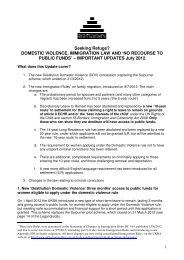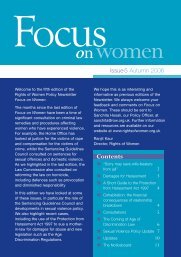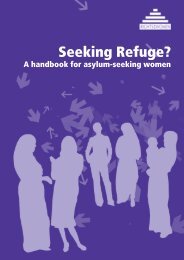Parental Responsibility - Rights of Women
Parental Responsibility - Rights of Women
Parental Responsibility - Rights of Women
Create successful ePaper yourself
Turn your PDF publications into a flip-book with our unique Google optimized e-Paper software.
For further information about these issues<br />
please see our Guide to Residence<br />
Orders and Guide to Lesbian Parenting.<br />
Local Authorities<br />
A local authority social services department<br />
can acquire PR for a child if the court<br />
makes a care order (including an<br />
emergemcy protection order or interim<br />
care order) in respect <strong>of</strong> that child. The<br />
local authority will then share PR with<br />
anyone else who has PR for the child.<br />
What does having PR mean?<br />
The CA 89 allows everyone who has PR to<br />
be involved in the important decisions that<br />
have to be made as your child grows up.<br />
This includes decisions about education,<br />
health and medical treatment, religion and<br />
leaving the country. If more than one<br />
person has PR, they should try to reach an<br />
agreement about the decision but if they<br />
cannot, then either <strong>of</strong> them can apply to<br />
the court for a decision. This is called an<br />
application for a specific issue order.<br />
The court can also stop a person with PR<br />
from making a decision about a child (for<br />
example removing them from school or<br />
taking them abroad) by making a<br />
prohibited steps order. When making<br />
any decision about any aspect <strong>of</strong> a child’s<br />
upbringing, the child’s welfare is the most<br />
important factor the court will consider.<br />
For further information about these issues<br />
see our information sheet When Parents<br />
Separate.<br />
More than one person can have PR for a<br />
child. With the exception <strong>of</strong> special<br />
guardians (see above), no one person has<br />
a greater right to have a say in decisions<br />
than the other or others with PR and no<br />
one can override a decision made by the<br />
other without a court order to do so.<br />
Everyone with PR has an equal right to<br />
make or be involved in the important<br />
decisions in a child’s life.<br />
However, the law recognises that the<br />
exercise <strong>of</strong> PR has to be realistic. For<br />
example when a couple separate, the<br />
person with whom the child lives is<br />
allowed to make all the day-to-day<br />
decisions about the child. Having PR does<br />
not give a non-resident parent the right to<br />
interfere in the day-to-day management <strong>of</strong><br />
the child’s life.<br />
If another person subsequently acquires<br />
PR for a child the other people who already<br />
have PR do not lose it unless the court<br />
makes an order. PR cannot be surrendered<br />
or transferred to another person by the<br />
person with PR.<br />
What will the court consider in a<br />
PR application?<br />
The CA 89 says that when the court makes<br />
any decision about a child, the child’s<br />
welfare must be the court’s “paramount<br />
consideration”. This means it must<br />
consider the child’s welfare above<br />
everything else. When making a decision<br />
the court must consider all your child’s<br />
circumstances and in particular the<br />
following factors:<br />
your child’s wishes and feelings<br />
depending on her or his age and<br />
understanding (generally the older your<br />
child is the more attention the court will<br />
pay to those wishes and feelings)<br />
your child’s physical, emotional and<br />
educational needs (this includes<br />
practical needs such as accommodation<br />
and food as well as love and affection)<br />
the likely effect on your child <strong>of</strong> any<br />
change in her or his circumstances<br />
(the court will look at the previous or
















